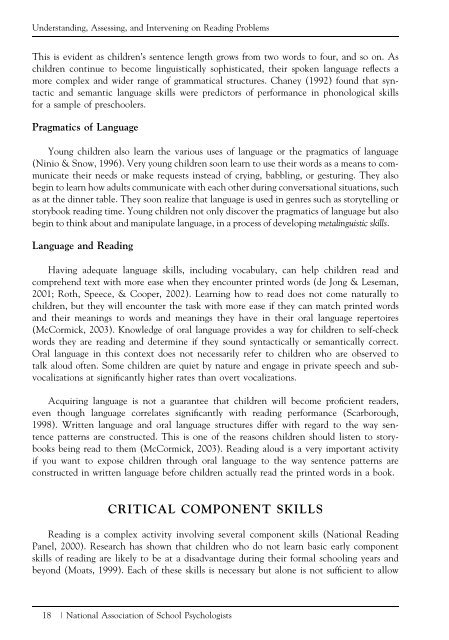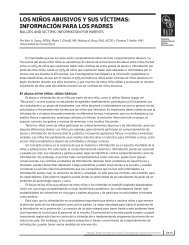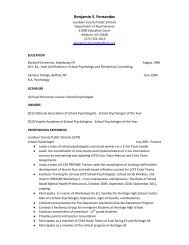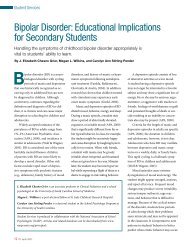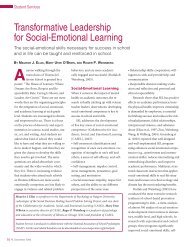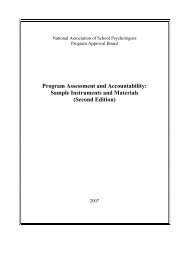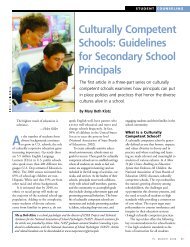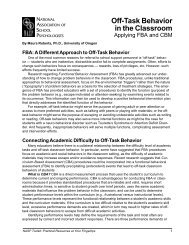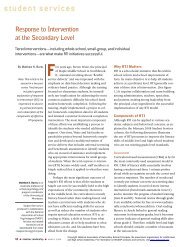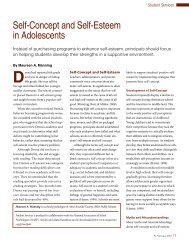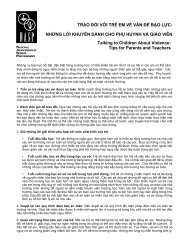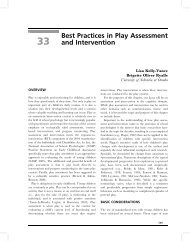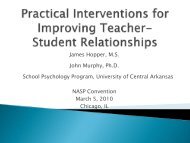Chapter 1 - National Association of School Psychologists
Chapter 1 - National Association of School Psychologists
Chapter 1 - National Association of School Psychologists
You also want an ePaper? Increase the reach of your titles
YUMPU automatically turns print PDFs into web optimized ePapers that Google loves.
Understanding, Assessing, and Intervening on Reading Problems<br />
This is evident as children’s sentence length grows from two words to four, and so on. As<br />
children continue to become linguistically sophisticated, their spoken language reflects a<br />
more complex and wider range <strong>of</strong> grammatical structures. Chaney (1992) found that syntactic<br />
and semantic language skills were predictors <strong>of</strong> performance in phonological skills<br />
for a sample <strong>of</strong> preschoolers.<br />
Pragmatics <strong>of</strong> Language<br />
Young children also learn the various uses <strong>of</strong> language or the pragmatics <strong>of</strong> language<br />
(Ninio & Snow, 1996). Very young children soon learn to use their words as a means to communicate<br />
their needs or make requests instead <strong>of</strong> crying, babbling, or gesturing. They also<br />
begin to learn how adults communicate with each other during conversational situations, such<br />
as at the dinner table. They soon realize that language is used in genres such as storytelling or<br />
storybook reading time. Young children not only discover the pragmatics <strong>of</strong> language but also<br />
begin to think about and manipulate language, in a process <strong>of</strong> developing metalinguistic skills.<br />
Language and Reading<br />
Having adequate language skills, including vocabulary, can help children read and<br />
comprehend text with more ease when they encounter printed words (de Jong & Leseman,<br />
2001; Roth, Speece, & Cooper, 2002). Learning how to read does not come naturally to<br />
children, but they will encounter the task with more ease if they can match printed words<br />
and their meanings to words and meanings they have in their oral language repertoires<br />
(McCormick, 2003). Knowledge <strong>of</strong> oral language provides a way for children to self-check<br />
words they are reading and determine if they sound syntactically or semantically correct.<br />
Oral language in this context does not necessarily refer to children who are observed to<br />
talk aloud <strong>of</strong>ten. Some children are quiet by nature and engage in private speech and subvocalizations<br />
at significantly higher rates than overt vocalizations.<br />
Acquiring language is not a guarantee that children will become pr<strong>of</strong>icient readers,<br />
even though language correlates significantly with reading performance (Scarborough,<br />
1998). Written language and oral language structures differ with regard to the way sentence<br />
patterns are constructed. This is one <strong>of</strong> the reasons children should listen to storybooks<br />
being read to them (McCormick, 2003). Reading aloud is a very important activity<br />
if you want to expose children through oral language to the way sentence patterns are<br />
constructed in written language before children actually read the printed words in a book.<br />
CRITICAL COMPONENT SKILLS<br />
Reading is a complex activity involving several component skills (<strong>National</strong> Reading<br />
Panel, 2000). Research has shown that children who do not learn basic early component<br />
skills <strong>of</strong> reading are likely to be at a disadvantage during their formal schooling years and<br />
beyond (Moats, 1999). Each <strong>of</strong> these skills is necessary but alone is not sufficient to allow<br />
18 <strong>National</strong> <strong>Association</strong> <strong>of</strong> <strong>School</strong> <strong>Psychologists</strong>


